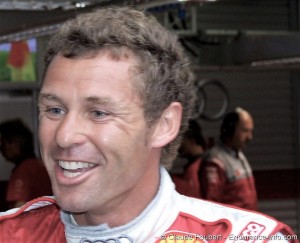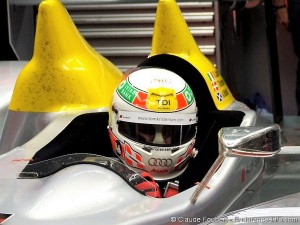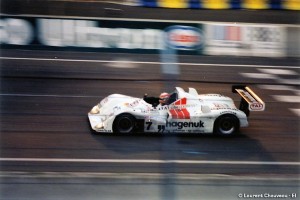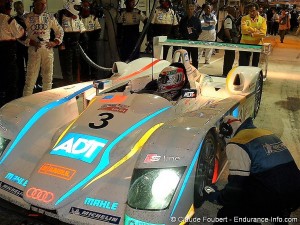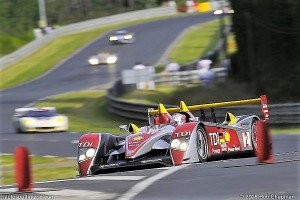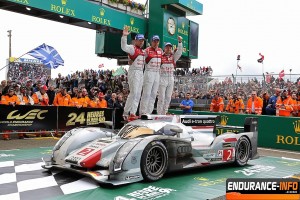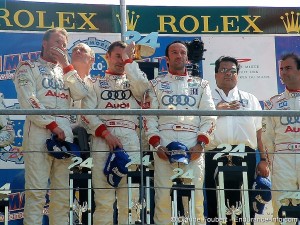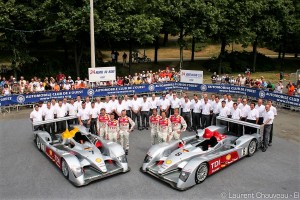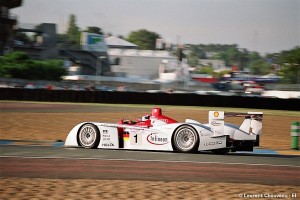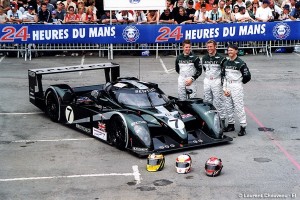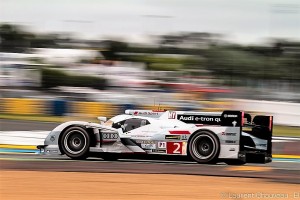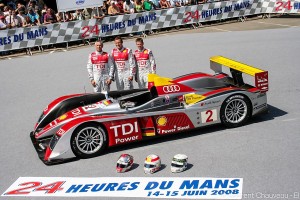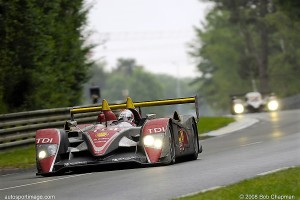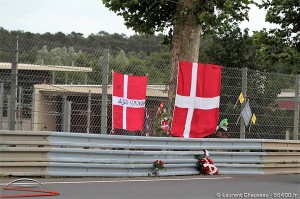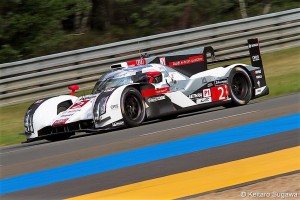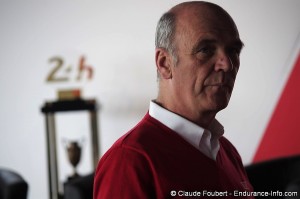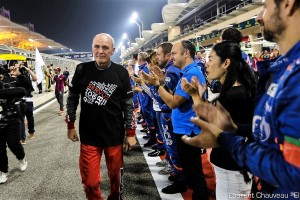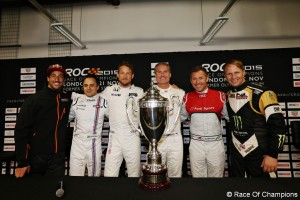Our 2016 column dedicated to the Club des Pilotes des 24 Heures du Mans is concluding on a high note. Tom Kristensen, record-holder of victories at Le Mans with nine wins, including an incredible series of six consecutive wins between 2000 and 2005, has agreed to answer a few questions for Endurance-Info, the Danish driver offering so a nice Christmas gift to our readers. We thank him warmly.
Tom, when you were a kid, who were your icons in motorsport, and later on, as a young driver, who were them ?
It was my dad, Mario Andretti (who looked similar to my dad…), Derek Bell and Jacky Ickx. They were extremely versatile, tried many different things and the longevity of their careers was stunning.
When you started racing, what did Le Mans represent for you ? Were you already thinking about racing there ?
Like every race driver, I always wanted to do this race. It’s the greatest challenge in motorsport and I had planned to do it after I had reached my target to compete in Formula 1. So I got to Le Mans a bit earlier, which turned out to be a good move when looking back. Already as a junior driver, I’ve had a soft spot for Le Mans. In 1990, a go-kart race in Denmark was halted so that we could see our fellow Danish countryman John Nielsen crossing the finishing line at Le Mans as the winner.
You have been winner at Le Mans in 1997 with the TWR-Porsche for your first race in the Sarthe. Had you ever driven a prototype before and did you think that you could win the race ?
The Porsche was entered by team Joest Racing. Their Technical Director Ralf Jüttner called my a week before the race to join Michele Alboreto and Stefan Johansson. The rest is history: I only did 17 laps in practice, but ended up winning the event with those two great drivers. Michele new the car best, and I’ve learned a lot from him. He never told me anything unless I asked him. It was not the first time that I drove a sports prototype, but it was my first race at Le Mans, and the first time to drive this open-topped, right-hand driven sports prototype. The debut win was great, and at the end, I even managed to establish a new lap record.
Is it due to this first race at Le Mans that you took your career towards endurance racing ? A matter of opportunity or of personal interest ?
Obviously, it was a great opportunity and was a turning point in my career. Up to that point, I had not focused on sports cars, but eventually, this became the category that I adored the most and that netted me my series of Le Mans results.
Only three drivers have been winners at Le Mans in the Xxth and the XXIst century : you (1997 and eight more races in the XXIst century), Alexander Wurz (1996 and 2009) and Allan McNish (1998 and 2008) and only two drivers have won with a petrol car, a diesel car and a hybrid car : you (1997 with the TWR Porsche, 2008 with the Audi R10 TDI and 2013 with the Audi R18 e-tron quattro) and Allan McNish (1998 with a Porsche 911 GT1, 2006 with the R10 TDI and 2013 with the R18 e-tron quattro), so is it something you are proud of ?
Yes, I am proud of those achievements, but there is another special historical aspect, too: Only Jacky Ickx, Allan McNish and myself managed to win Le Mans in three different decades. I’ve participated in Le Mans 18 times and clinched 14 podium finishes including nine wins.
Was it different to drive a petrol car, a diesel car or a hybrid car ? Can you explain why?
Those cars are worlds apart. I was privileged to drive so many different concepts in my career that required completely different driving styles, owing to different weight distribution, power delivery and many other aspects. Also, there is a huge difference between normally-aspirated and turbocharged engines, and at Audi, we’ve had direct injection FSI engines between 2001 and 2005. The driving styles evolved a lot in this era.
The biggest step was clearly the Audi R10 TDI with its torquey and powerful V12 TDI engine, a special differential and a weight distribution biased heavily towards the rear. This car was certainly the furthest away from a traditional driving style. The Audi R8 was simply a fantastic car, and the Audi R18 e-tron quattro with its hybrid drive was very agile and extremely complex.
Emanuele Pirro told Endurance-Info recently that his favourite Le Mans car was the Audi R8. So, what is yours?
I agree with Emanuele. Every time that the Audi R8 won Le Mans, I was part of the line-up, so it is clearly one of my favourite cars. The car also made a name that has been picked up by AUDI AG to baptize its first thoroughbred road-going sports car accordingly. So the Audi R8 was a top sportscar with a very long career.
The Bentley was the most elegant car, and the 2013 Audi R18 e-tron quattro was very aggressive in a positive way and had extremely good looks.
You have been long-time partner at Le Mans with Rinaldo Capello and Allan McNish with seven Le Mans races together and you have raced nine times at Le Mans with Dindo. Had each of you a specific rôle in the line-up ? Can you say some words about Allan and Dindo?
Yes, they clearly had specific roles: Allan would always suggest a restaurant and Dindo would pay if only he would have found his wallet! Seriously, I’ve been teamed up with many drivers, and those two were extraordinary mates. A long relationship has evolved between us in ALMS, at Le Mans and up to the FIA WEC. So it was one of the most long-standing driver line-ups at Audi and in sportscar racing. Our working relationship really grew into a personal friendship.
Which of your nine wins are your favourite ? Why ? Is there one (some) race that you regret you have not won it ?
Ask a father if he has a favourite child, and he will say no. It’s the same with me, and I also don’t have a favourite Le Mans win, as all of them were special. Four of them stand out: 1997 because it was my first one, 2001 because it was a tough race in torrential rain, 2008 because of an incredible battle with Peugeot and 2013 because of the extreme psychological circumstances, from a personal background as well as owing to the death of my Danish countryman Allan Simonsen during that race.
The races that I regret not to have won were the ones in 1999 and in 2007 because we had built up a comfortable lead in each of them before we lost them. And in 2014, a broken turbo cost us the chance to win again.
Beside Le Mans, what were your favourite tracks and events?
I really like the tracks at Suzuka, Sebring and Road America. Regarding events, the Goodwood Revival is most appealing to me.
You hve been working for a long time with Dr Wolfgang Ullrich ? What was your relationship with him ? What kind of manager was he ? Do you think that it could be called « Monsieur Le Mans » as Jacky Ickx and you ?
His vision, his commitment and his great personality make him so special. I would say that he is the best motorsport boss that I’ve ever had, and I think quite a few drivers would share this opinion.
You were at Bahrain for the last 2016 WEC event and the last one for Audi. So, you have seen close the atmosphere inside the Audi team. What was dominant : joy because of the win and the first two positions, pride for the Audi’s 18 years or sadness due to the retirement ?
I can’t see one of those aspects dominating the weekend. I feel it was a mix of those elements. And clearly, after the finish of the race, we concluded a chapter full of pride and joy on a day when we celebrated the heritage of 18 years in sportscar racing. This win was so important.
Next January, you will compete in the Race of Champions. You have won two times the Nations Cup with Mattias Ekström and Petter Solberg, but you have never been Champion of Champions although you have been four times runner-up. So, will you go for the win at Miami ?
I feel privileged still to be invited two years after I have finished my career and again, I want to give the best. You never know what results this event will net for you, but it’s always fun, it’s fast, it’s fantastic and I love the camaraderie in the paddock.
You are the President of the FIA Driver’s Commission. What are your main focuses ?
It is an honour to help shaping some aspects of the future of our sport. It was a duty that I fully and enthusiastically accepted when FIA President Jean Todt asked me to do so. As President of the FIA Drivers Commission, I want to give things back to the sport that I’ve always loved. This really is an honour. It is an advisory role for us in the commission as we get questions or ideas from other commissions as well. We suggest our solutions that have an impact on future motor racing technologies, for example on circuit safety or on track design and track limits. Sometimes, modern tracks can be too clinical and too forgiving. We cover off-road, hillclimb, rallying and other sports. So it’s an umbrella comission for all disciplines in motor racing.
More pictures here



